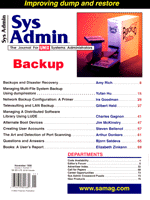
Listing 1: mdump
#!/usr/bin/perl
# dump multiple file systems to one tape
# usage: mdump [options] conf
#
# options:
# -l # dump level, default 0
# -u update dumptable, default no
# -f dev tape device default back:/dev/nrst24
# no-rewind device name required
# -e eject the tape
#
# The configure file conf contains file systems to be dumped. The content looks
# like this
# host:/
# host:/usr
#
# Each line contains exactly one file system to dump. The file system should be
# give in the form of the path to the mount point of the filesystem, not the raw
# device name. The host part can be omitted if the file system is on local disk
# where the mdump is running
#
# mdump uses rsh, hostname, dd, mt, dump and rdump. Make sure the path include
# all directories on all systems you want to do backup
# On SunOS 4.1.3, dump and rdump is in /usr/etc
# On Linux RedHat 5.1, rdump is in /sbin.
# Add other directory to suite your needs
$ENV{'PATH'} = '/bin:/usr/etc:/sbin:/usr/bin:/usr/ucb';
# default options
$opt_l = "5";
$opt_u = "";
$opt_f = "back:/dev/nrst24";
$opt_e = 0;
$opt_d = 0;
$magic = '###mdump###';
chop( $localhost = qx/hostname/ );
$localhost || die "Unable to determine the local host name: $!\n";
# I am using a Exabyte 8700LT which is able to write 8500c format onto 8mm tapes
# your parameters may vary
$bdsf = "bdsf 126 54000 26000";
# collect all the options
use Getopt::Std;
&getopts('l:f:ued');
$opt_u && ($opt_u = 'u');
print "Mdump options:
Level=$opt_l
Update=$opt_u
device=$opt_f
Eject=$opt_e
\n" if $opt_d;
@ARGV || die "No file system to dump. Exiting\n";
# decide the dump device name and host
($dump_host, $dump_dev) = split(':', $opt_f);
$dump_dev || do { $dump_dev = $dump_host; $dump_host = "localhost"; };
($dump_host eq $localhost) && ($dump_host = 'localhost');
($dump_dev && $dump_host) || die "Please supply dump device using -f option\n";
print "Dump device: $dump_dev on $dump_host\n" if $opt_d;
print "Local host name is: $localhost\n" if $opt_d;
# collect file systems to dump
@filesys = ();
$error = 0;
while( @ARGV )
{
incl( shift @ARGV );
}
@filesys || die "No file system to dump\n";
if( $opt_d )
{
my($fs) = 0;
print "Dumpping following file systems using level $opt_l:\n";
foreach $name ( @filesys )
{
$fs++;
print "\t$fs $name\n";
}
}
$error && die "Error enountered, exiting\n";
$| = 1;
# decide the mt command
$mt = "mt -f $dump_dev";
$mt = "rsh $dump_host $mt" unless $dump_host eq 'localhost';
# rewind the tape
do_system("$mt rewind");
# decide the dd command to use
$dd = "dd";
$dd = "rsh $dump_host $dd" unless $dump_host eq 'localhost';
# save the configuration at the beginning of the tape
print "$dd of=$dump_dev\n" if $opt_d;
open( DD, "| $dd of=$dump_dev" ) || die "Cannot run $dd: $!\n";
# print the magic word
print DD "$magic Version 1.0 (July 9 1998)\n";
print DD join(';', @filesys),"\n", ' 'x1024, "\n";
close DD;
# do the real dump
while( $arg = shift @filesys )
{
my($dev) = $opt_f;
# remove the host part if it is the same as the device host
$host = "";
$fs = $arg;
($fs =~ /:/) && (($host,$fs)=split(':', $fs) );
$dev =~ s/^$host://;
$cmd = "rdump $opt_l$opt_u" . "$bdsf $dev";
if( $host && ($host ne $localhost) )
{
$cmd = "rsh -n $host $cmd";
}
print "$cmd $fs\n";
system "$cmd $fs" || warn "$cmd $fs: $!\n";
}
# eject the tape if required
$opt_e && do_system("$mt offline");
# include file system into the dump list in the order given
# if a name given is a file, the file is taken to be a configuration file
# with each line corresponding to a file system
sub incl {
my( $file ) = @_;
# if $file is a directory, it is treated as a mount point for a file system
#
if( ! -f $file ) {
my($host) = ();
( $file =~ /:/ ) && ( ($host,$file) = split(':', $file) );
( !$host || $host eq 'localhost') && ($host = $localhost);
push @filesys, "$host:$file"; return;
}
open(IN, $file ) || warn "Cannot open configuration $file: $!\n"
&& ($error = 1) && return;
while(<IN>)
{
/^#/ && next;
foreach $fs ( split )
{
$fs =~ s/\s//g;
# the contents of the configuration file is pushed back to
# ARGV so we can have nested configuration files
$fs && push(@ARGV, $fs);
}
}
close IN;
}
sub do_system {
my($cmd) = @_;
print "$cmd ...." if $opt_d;
my($system) = system($cmd);
print "successed\n" if $system == 0 && $opt_d;
print "failed\n" if $system && $opt_d;
}
# End of File
|